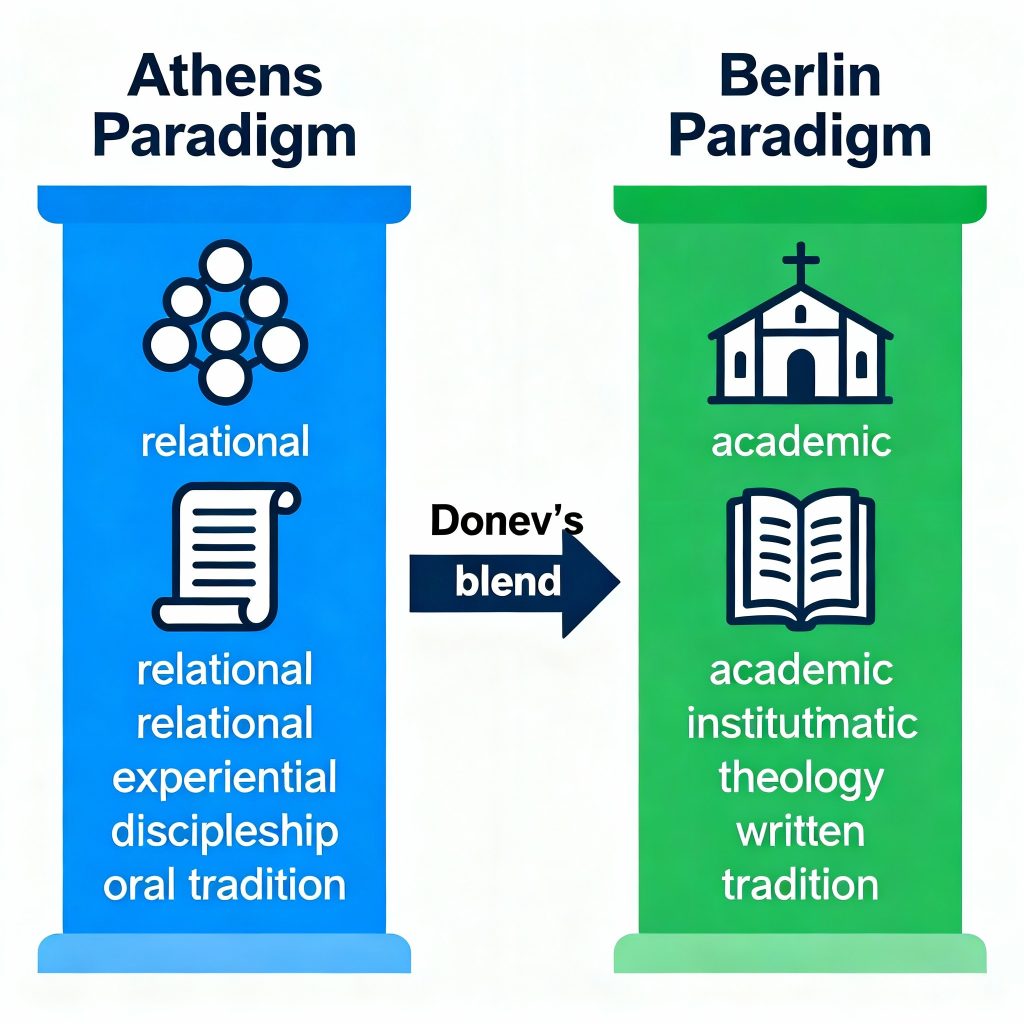Frameworks and Key Terms by Dr. Dony Donev: Athens vs Berlin Paradigm Shift
Core Theological Frameworks
U.S.H.E.R. Model of Communion
A theological framework coined during the Covid-19 Pandemic in Donev’s Intro to Digital Discipleship course at Lee University. It defines what follows Communion in Christian catechism, identifying five foundational dynamics for disciple growth: Unity, Sanctification, Hope, Ecclesial communion, and Redemptive mission.
Freedom Theology (Theology of Freedom)
Developed through Donev’s research on postcommunist Eastern Europe and the Bulgarian Protestant experience, this framework explores biblical concepts of freedom, liberation from both sin and socio-political oppression, and the church’s transformative mission as a liberator in history. It often appears in his writings as “Feast of Freedom,” drawing connections between national liberation and spiritual renewal.
Primitive Church Restorationist Model
Based in his historical research, Donev advocates for returning to the original practices and structure of the Early (Primitive) Church. This model emphasizes rediscovering authentic spiritual identity, intergenerational faith transmission, and revivalist community rooted in biblical precedent.
These frameworks have had meaningful impact on global Pentecostal studies, digital discipleship, and liberation theology, addressing contemporary challenges in theology, worship, and ecclesial practice.
Effect on Donev’s Models
-
U.S.H.E.R. Model: By anchoring his post-Communion framework in the “Athens” paradigm, Donev prioritizes unity, lived discipleship, and communal mission over purely doctrinal or institutional forms. This perspective shapes the model to valorize shared spiritual experience and relational growth, not just catechetical instruction.
-
Freedom Theology: “Athens” influences Donev’s liberation emphasis by grounding freedom in communal lived reality, while “Berlin” marks the shift toward codifying and structurally analyzing liberation.
-
Primitive Church Restoration: Donev navigates between Athens’ restorationist, dialogical church identity and Berlin’s historical-critical, analytical methodology, advocating an integration that revitalizes spiritual community while acknowledging scholarly insights.
In sum, Donev’s “Athens vs Berlin” usage intentionally blends experiential, relational Christian practice (“Athens”) with disciplined, systematic theology (“Berlin”). This dynamic underlies his frameworks, ensuring they are both deeply incarnational and critically constructive.
The Missional Church
 The nature of the church is missional, through the fact that its existence is powered by the Great Commission. The book summarizes the culture of today’s American spirituality and its relation to the apostolic church. The main question is, “What would a theology of the church look like that took seriously the fact that North America is now itself a mission field?”
The nature of the church is missional, through the fact that its existence is powered by the Great Commission. The book summarizes the culture of today’s American spirituality and its relation to the apostolic church. The main question is, “What would a theology of the church look like that took seriously the fact that North America is now itself a mission field?”
Five Key Insights
1. The missional nature of the church – The place which the church takes in the surrounding world/society defines its nature as missional. How it interacts with the surrounding worlds identifies the church’s response to the needs of individuals and groups of people and results in its success/failure to fulfill its original mission. A valid point was the statement that the witness of the missional church is characterized by its integrity.
2. Recovering missional identity – Recovering the church’s original New Testament identity has been a subject of discussion for many various ages in church history. The volume of works written about it has indeed increased in the latter part of the 20th century. The discussion in the book claims that as truth, self, and society are rediscovered in postmodernism, the churches of North America will recover its missional identity. Thus, the individual search of identity will reflect on the corporate search of the church as a community and as the Body of Christ. Chapter four further claims that the churches missional identity is shaped by the gospel of the reign of God which Jesus preached.
3. The Holy Spirit and the community of the missional churches – The Chapter on the Holy Spirit, although very informative, did not integrate the connection between the Spirit and Missional outreach to a practical paradigm, but it was mostly a theoretic and philosophical proposition.
4. On spiritual leadership – the discussion on spiritual leadership is based on the axiom that leadership is focused on the reign of God. Only then the church assumes its mission. Solving problems and creating unity within the church is reached through the same focus on the reign of God.
5. The secular surroundings – the vision of the church may not align with the secular surrounds. Actually, it may often completely contradict them fulfilling its role as a prophetic utterance. At the same time, social, political and economical factors may oppose the message and the mission of the church, thus creating an atmosphere in which the church grows against the grain.








